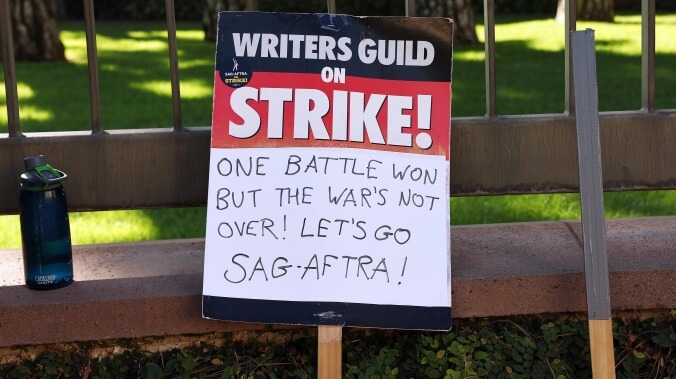The Writers Guild Of America strike is over
Though it still must be ratified, the WGA deal includes protections against AI, minimum staffing requirements, and bonuses for successful streaming content

The Writers Guild Of America has just announced that, as of 12:01 AM on Wednesday, September 27, the WGA strike will be over. After reaching a tentative agreement with the AMPTP late Sunday night, the union’s Negotiating Committee took that agreement to the WGA West’s board and the WGA East’s council, who all voted “unanimously” to recommend the agreement to the two guilds’ members for approval. It still needs to be ratified by union members, who will begin voting on October 2, but the strike has now been lifted and writers are free to go back to work—with the union noting that lifting the strike and going back to work should not impact anyone’s “right to make a final determination on contract approval” (meaning everyone could still vote to reject this deal if they want to, and they should not be swayed by the decision to end the strike).
Over the next few weeks, everyone who follows the entertainment industry will be closely examining the terms of the deal that the WGA fought so hard to win—with nearly 150 days on the picket lines—but the union has shared a summary of the Memorandum Of Agreement that includes some particularly noteworthy highlights. For one thing, there’s language that should prevent screenwriters from being replaced by AI, even as “source material” (presumably meaning a studio can’t get an AI to come up with a movie idea and then have a human writer actually write it).
Beyond that, the agreement says that AI “can’t write or rewrite literary material,” that a company “can’t require [a] writer” to use AI software, and that a company must inform a writer if any materials they’re basing their work off of have been generated by an AI. Basically, it sounds like it means that a writer can’t be forced to use AI, replaced by AI, or tricked into using something generated by AI—which is all cool as hell.
There are also increased minimums and new payment structures, new minimum staffing requirements for writers’ rooms (which seems like a huge win), and a “viewership-based streaming bonus” for writers working on “High Budget Subscription Video On Demand” projects (like a big Netflix show or whatever) that comes into play if a project is viewed by at least 20 percent of a streaming service’s audience.
Speaking of, the studios have agreed to give the WGA data indicating the “total number of hours streamed” for “self-produced high budget streaming programs” (again, a Netflix show), and while the union will have to agree to a “confidentiality agreement,” it can share that information “with the membership in an aggregated form.” That means, if the WGA agrees to keep it a secret, Netflix (or whoever) will provide actual specific viewership data, which we have never really ever seen before.
It all sounds like a bunch of solid wins for the WGA, since even the stuff the union gave up (like allowing a company to release a streaming project in theaters after debuting on a streaming platform) seems fairly inoffensive compared to the gains. Now we just have to hope SAG-AFTRA gets what it wants, then the striking United Auto Workers members, and we can officially declare this a win for the unions across the board. Unions work! The President says so!